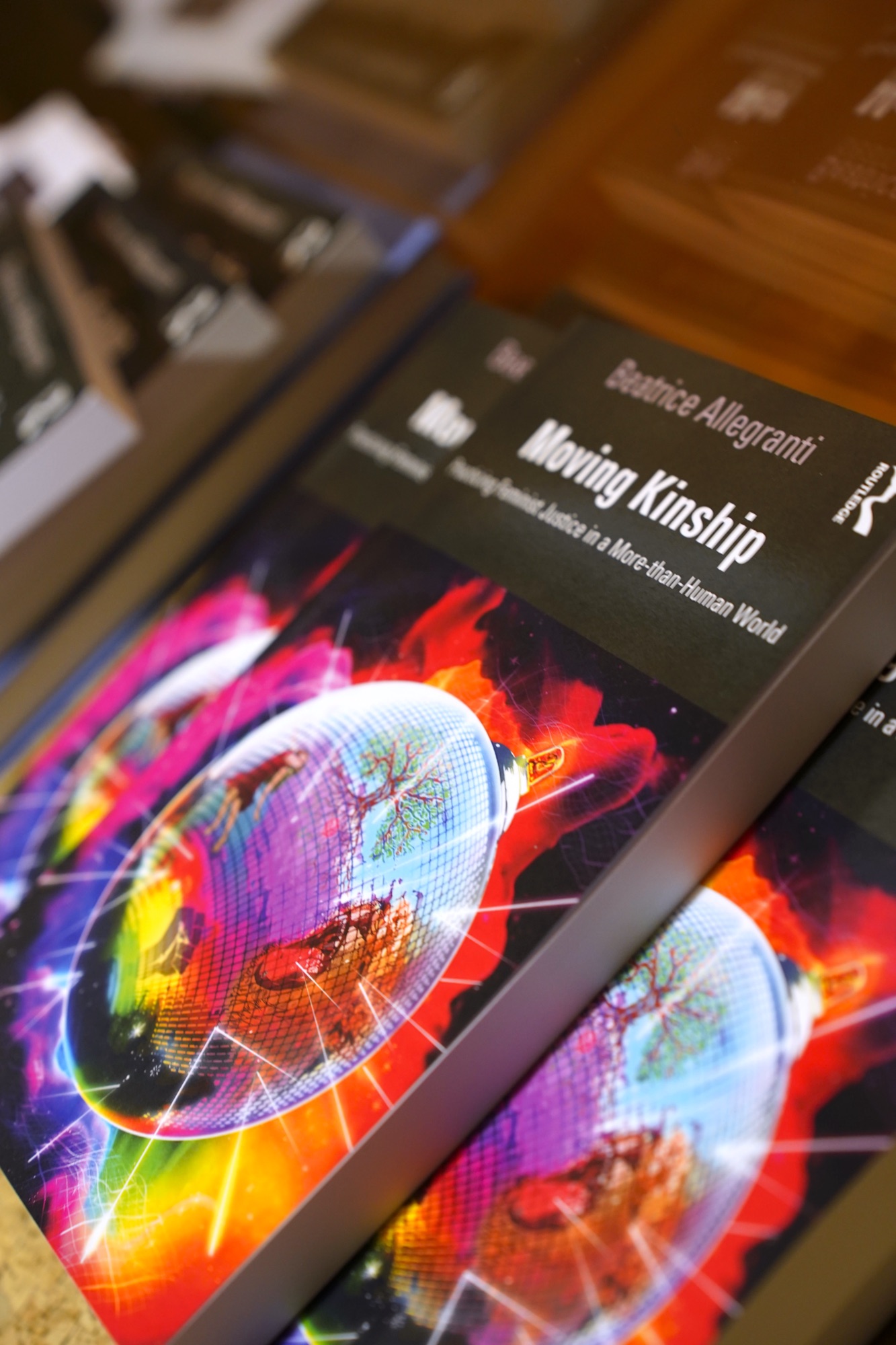Words by Sarah Lapinsky.
I’m going to start this review by saying I think you should read this book. Okay, hold on– I’ll qualify that: if you are interested in movement, connection, feminism, embodiment, psychotherapy, emotional processing, have ever experienced grief or trauma, heard the words “kinesthetic empathy,” or even if you haven’t and you’re wondering ‘what on earth does that mean’ — this brilliant book by Beatrice Allegranti is for you.
Moving Kinship: Practicing Feminist Justice in a More-than-Human World is more than an academic review of a trans-disciplinary practice-led research project exploring the experience of grief, early-onset dementia and trans-generational trauma, it is an impressively intimate work. The book is filled to the brim with inspiring insights and moving anecdotes of personal accounts that transcend theoretical application, where Allegranti offers an embodied invitation to join in and “move with the trouble.”
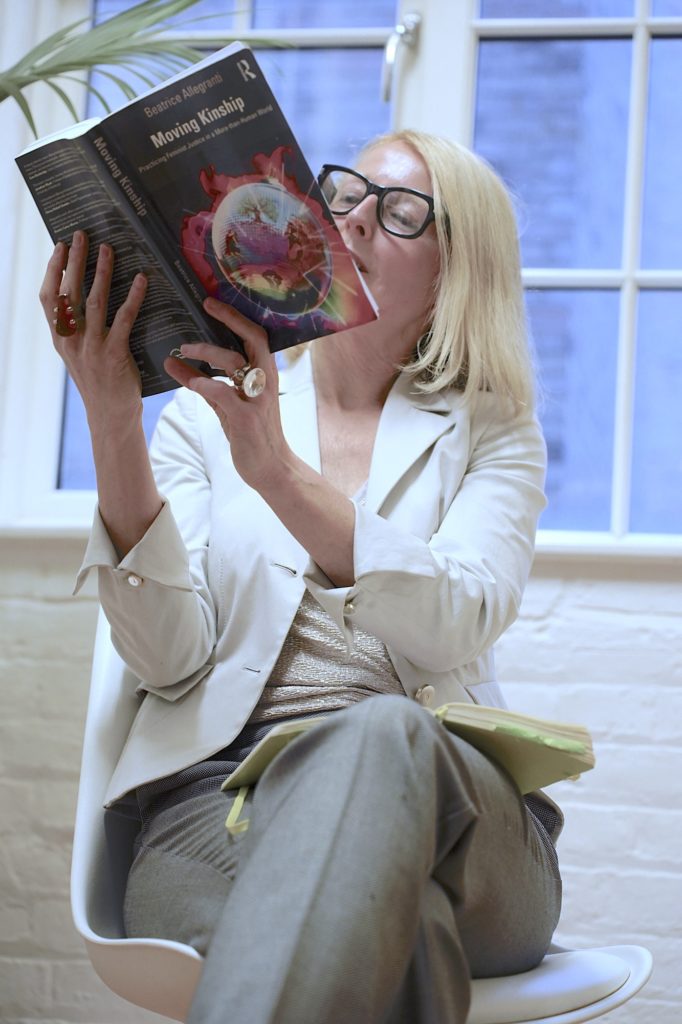
It may look intimidating, but I promise it is an extraordinarily enjoyable read. The book formatted into three parts:
PART I: Moving the More-Than outlines Allegranti’s previous work, background and feminist positionality. This section provides an overview of the Moving Kinship project comprising of conversations (interviews) with participants and collaborators, bespoke performances, a dance film, Moving with the Trouble, and the discussion of theory woven through it all.
PART II: Moving Kinship Threaded through the chapters of this section is an in-depth investigation into understanding the effects of trans-generational trauma and grief that starts with Allegranti’s’ relationship with her own parents, and expands through the experiences of the participants and artistic team in the Moving Kinship project. Through descriptions of conversations with participants such as Yvonne who experienced the effects of Primary Progressive Aphasia and Souji who had early-onset dementia, Allegranti shares the artistic process that led to Moving Kinship bespoke performances, providing rich opportunities for reflection on the nuanced “kin-aesthetic” experiences that they evoke. In the film, Moving with the Trouble, and the chapter by the same name, Allegranti works with the creative team to develop the idea of “micro-activisms” that arise in moving with the more-than-human. The chapters continue to expand these ideas, including pieces researching queer kinship, and finding gestures of self-love that allow for an embodied activism.
It’s important to note here that you do not need to be an academic to understand and appreciate this work, as it’s deeply rooted in personal narratives and poetic passages that make feminist and decolonising theory accessible to the reader. I’m confident that anyone can find a connection to this work, dancer or not.
PART III: Transversal Movements offers a series of conversations accompanied by reflections on different methods of activism in addition to an account of “neurofeminist scholarship” discussing the practice of capoeira and its potential for social justice through a de-colonised perspective.
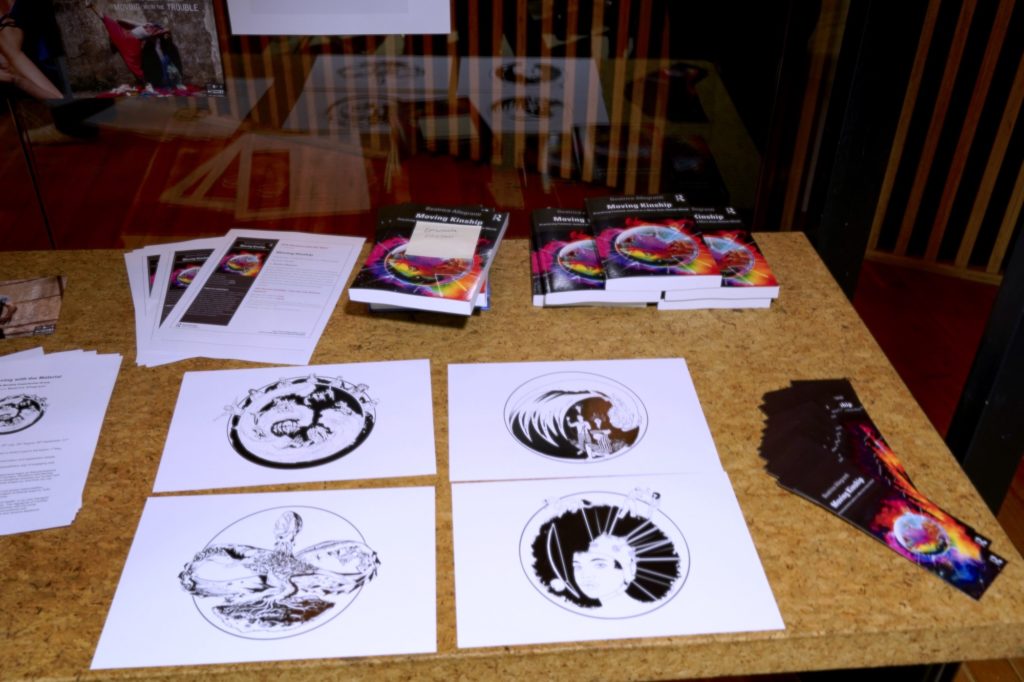
Each part is introduced with a thoughtful illustration created by Neil Max Emmanuel, visually representing the themes of the following section. Additionally, the book also features “invitations to land” pulling out specific quotes and poetry that draw the reader’s attention, providing pause for reflection, and allowing the material to sink in.
The best way to get a taste of what this book has to offer (besides reading it for yourself) will be through the excerpts and beautiful responses presented at the London book launch held on the 25th of April. It was a special event that encapsulated the experience of reading this book through responses of all kinds including one of my own (just a little further down the page)! In this, we celebrated the work and delighted in the community that this work and Allegranti herself has cultivated.
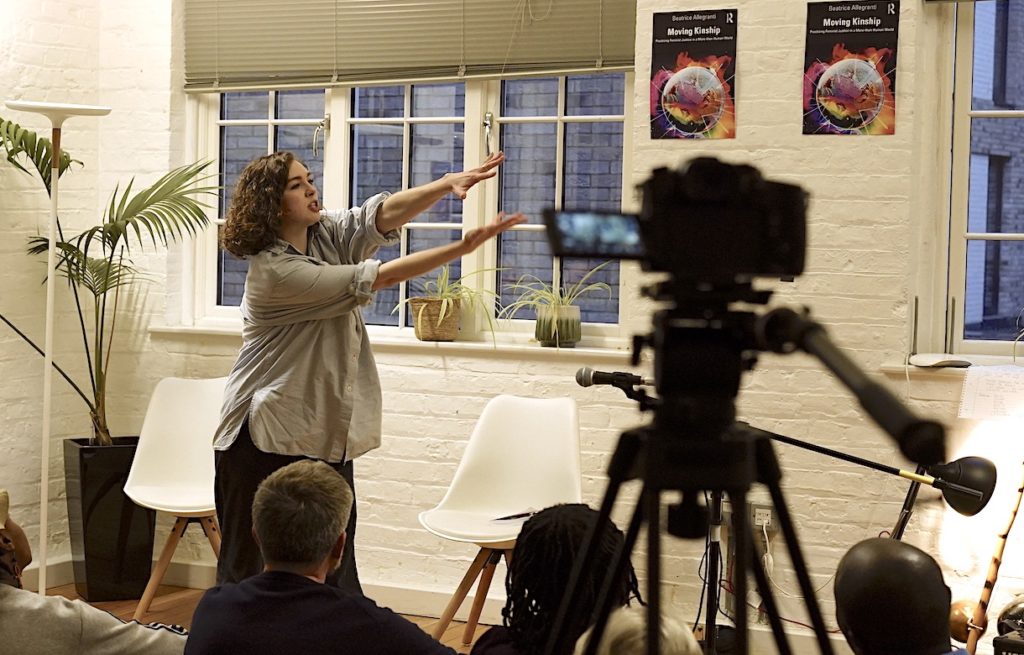
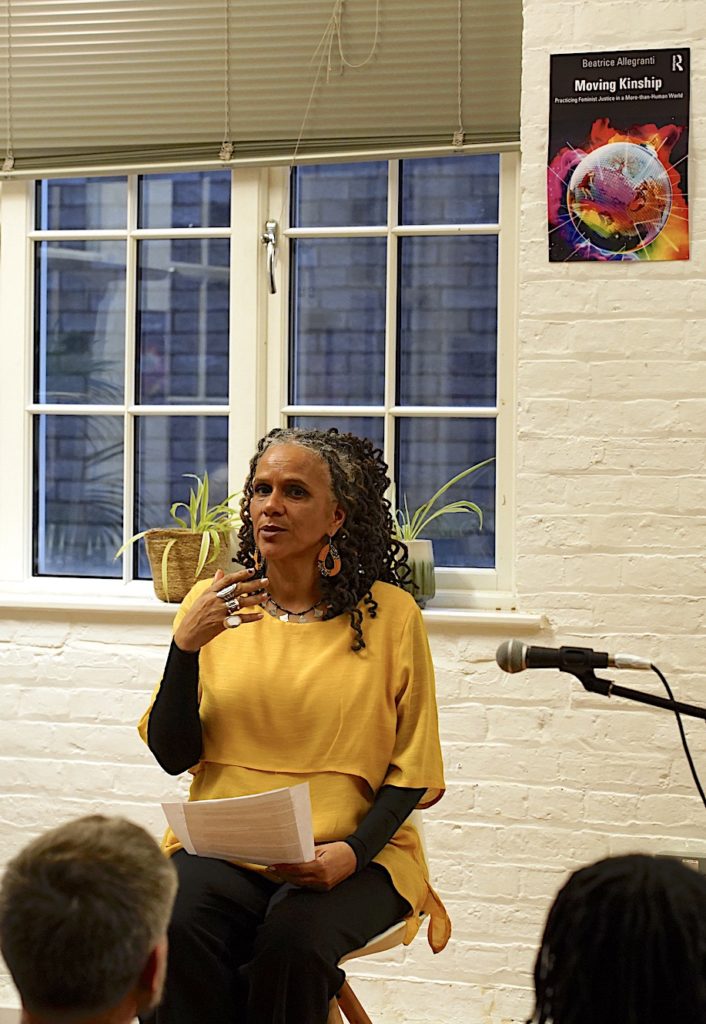
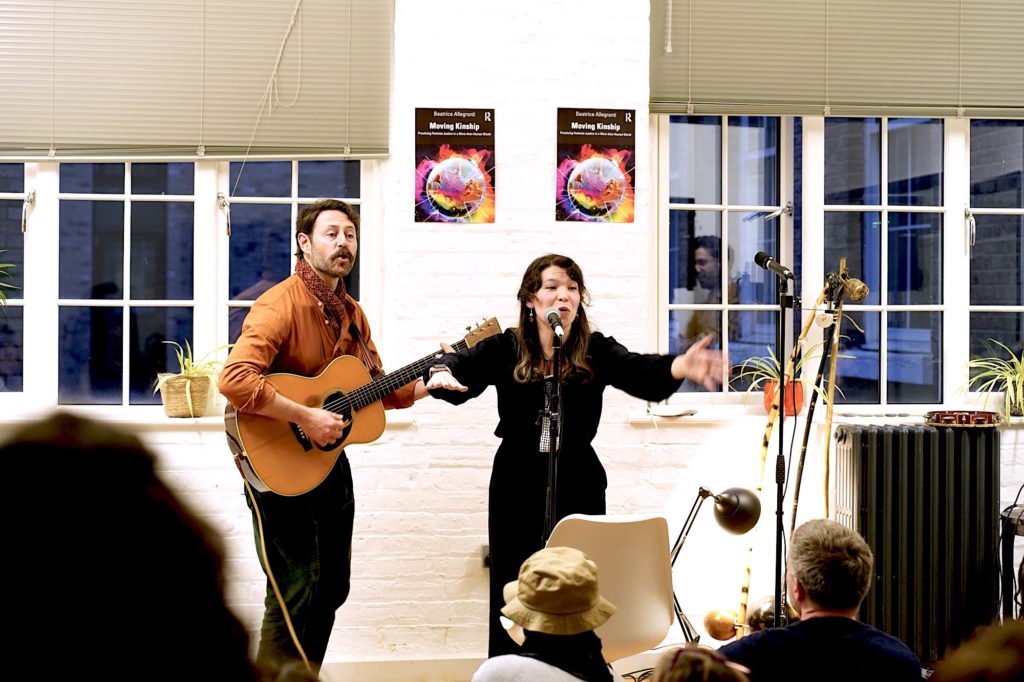
After a welcome from Jonathan Silas, Associate Professor at Middlesex University who also collaborates in the third part of the book, Allegranti shares some opening remarks before reading two extracts from the first chapter “Feminist Justice as More-Than.” The first extract, entitled “My Mother’s Library, Materialising” (linked below), comes from the first section and describes the influence her mother had and the values of accessible knowledge that have been passed down and ultimately led to this work. This was followed by a moment of reflection before Allegranti began reading the second extract: “My Father’s Funeral, Deathing,” which I will leave you all to experience for yourselves.
Listen to Beatrice reading this extract from the book: My Mother’s Library, Materialising and My Father’s Funeral, Deathing.
For my response, I read from a section in chapter three called “Fuck Tsunami” and followed that up with a response that incorporated movement and words. Check it out here!
Other responses of the evening include a reflection by:
- Takeshi Matsumoto (dance artist, choreographer, dance movement psychotherapist) who was involved in the original iteration of the project as a performer and a participant as his father Souji who lived with early-onset dementia.
- Foluke Taylor (therapist, writer, teacher living in the fluid histories and geographies of the Black diaspora) wrote a thought-provoking response highlighting the book’s importance as an application to the world beyond ourselves.
- Beatriz Calvo Merino (professor of cognitive neuroscience) described the work as “a very human book” and brought up the important idea that movement is the only way we can interact with the environment.
- The final response of the evening came from Todd Henkin and Gabi Toledo Machado who performed a song they’ve created which was inspired by words from the book. Recreating the call and response of Capoeira, we were invited to learn the words and sing along together.
It is unique to make a work that can inspire these sorts of responses; that invites and encourages you to take part and add on. I hope you’ll read this book and feel moved to create your own response as well. Any desire for movement, art or expression of feeling (there can be no wrong answers) would be a welcome and well-deserved reflection of this work.
To find out more about Beatrice visit her website and Instagram.
The book is available to purchase on Routledge with an automatic promo code reducing the price to £31.99 ) here or on Amazon.
Images by Julia Testa.
